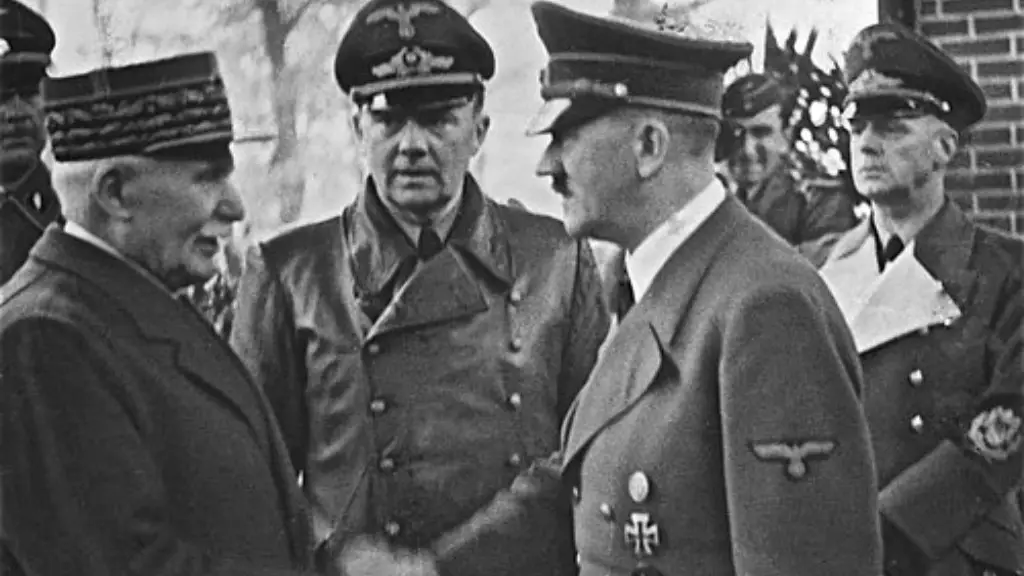Background Information
Adolf Hitler was an Austrian-born politician and the leader of the Nazi Party in Germany. He rose to power rapidly, becoming Chancellor of Germany in 1933 and then Führer in 1934. Hitler’s rule was marked by an intense militarism, anti-Semitism, and a highly militarized state. This formed the basis of the Third Reich, which was an authoritarian regime that dominated much of Europe until 1945.
Hitler is known for starting World War II after his invasion of Poland in 1939 and for leading Germany during the Holocaust, in which millions of Jews were murdered. He was also responsible for the catastrophic consequences of total war, the creation of concentration camps all over Europe, and the displacement of millions of people. Despite the horrors of the Holocaust, Hitler was popular among the German people because of his charismatic leadership and the economic successes of the Third Reich.
Relevant Data and Perspectives From Experts
Historians have debated the exact date on which Adolf Hitler took control of Germany. The earliest date that is widely accepted is January 30, 1933, when Hitler was appointed Chancellor of Germany following the collapse of the Weimar Republic. After this, Germany was ruled through a series of decrees as Hitler consolidated his power. He gained complete control of the country in August 1934, when President Paul von Hindenburg died and the office of President was merged with that of Chancellor, making Hitler the Führer of Germany.
Hitler’s control of German institutions was further consolidated with the passage of the Enabling Act on March 23, 1933. The Enabling Act granted Hitler the power to pass laws without the approval of the Reichstag and further entrenched the Nazi regime.
Expert perspective on the consequences of Hitler’s takeover of Germany is unambiguous and critical. Historian Ian Kershaw argues that Hitler and the Nazi regime were “the embodiment of a new, naked terror and a total dictator who reigned supreme over a country that had been plunged into barbarism.” Historian Alan Bullock concurs, claiming that the people of Germany “willed the coming of Hitler and accepted the regime he established, a dictatorship more absolute and more ruthless than any known in modern times.”
Insights and Analysis
The combination of charismatic leadership, economic prosperity, and totalitarian measures allowed Hitler to seize power in Germany and transform it into a brutal dictatorship. Hitler had a unique ability to appeal to the masses, as evidenced by his stunning electoral successes in 1930 and 1932. His promises of economic recovery proved to be enormously attractive to the German people after the ravages of the Great Depression. At the same time, Hitler used violence and intimidation to suppress dissent and to maintain his grip on power. He was willing to use any means necessary to protect and advance his regime, including the execution of political opponents and the use of concentration camps.
Hitler’s takeover of Germany was a tragedy for the world; it caused immense human suffering and led to the devastation of World War II. The warning signs of Hitler’s rise to power were evident in the early 1930s, but not enough was done to stop him. Now, more than 80 years later, we are still reckoning with the consequences of Hitler’s reign and the widespread destruction that followed.
Implications For Today
The rise of Adolf Hitler is an important reminder of the dangers of authoritarianism and the need to remain vigilant against such movements today. It is clear that political repression, economic desperation, and charismatic leadership can lead to devastating results if not properly addressed.
In recent years, we have seen a resurgence of strongman leaders around the world whose policies are eerily reminiscent of those of Hitler. Many of these leaders have used a combination of force, propaganda, and clever rhetoric to garner popular support and win elections. They have also taken steps to tighten their grip on power, from the undermining of democratic institutions to the implementation of oppressive policies.
It is essential that we recognize the dangers of these movements and speak out against them. History has shown us that authoritarianism, if left unchecked, can have devastating consequences. It is our responsibility to ensure that a similar catastrophe never happens again.
The Popularity of Hitler’s Regime
Adolf Hitler was a polarizing figure, but his popularity among the German people was undeniable. In an era of economic insecurity, the Nazi regime promised economic revival and millions of jobs. This was accompanied by a wave of national pride and the revival of German identity. The Nazi party also ran on a highly successful propaganda campaign, featuring Hitler’s iconic mustache and the Nazi salute. Hitler appeared to have all the answers the German people were looking for and he was able to tap into their sense of nationalism.
This appeal was further enhanced with the use of violence and intimidation to suppress dissidence from political rivals. The Nazi regime was extremely effective at controlling the minds of the German people, through the use of censorship, propaganda, and paranoia. It was this combination of emotional appeals and repression that allowed the Nazi party to remain in power for so long.
Hitler’s Impact on German Society
Hitler’s takeover of Germany had a far reaching impact on German society. Not only did it lead to extensive human suffering, but it also altered the foundations of German society. Hitler’s regime was marked by extreme authoritarianism, censorship, and suppression of dissent. This was particularly evident in the treatment of Jews and other minority groups, who were persecuted and oppressed during the Nazi reign.
Hitler also had a deep impact on the economy. His policies had some short-term successes, as Germany briefly achieved a degree of economic prosperity during the early years of his rule. However, these successes came at a high cost as the resources and damage resulting from two world wars were unsustainable. In the long-term, these policies contributed to the collapse of Germany’s economy.
Growth of Fascism in Europe
The rise of Hitler in Germany spawned a wave of fascism in Europe in the 1930s and early 1940s and ultimately led to World War II. In particular, fascist movements and ideologies spread to countries in Italy, Spain, and the Balkan states.
At the same time, the German invasion of other European countries created a wave of displacement that contributes to the current refugee crisis in Europe. Millions of people were forced to flee as they sought safety from Nazi aggression. This displacement created a population crisis in Europe, resulting in the creation of refugee camps and other facilities to house those who were uprooted from their homes.
Continued Ignorance of History
Despite the suffering and destruction that followed Hitler’s takeover of Germany, the ideology of fascism continues to linger in some parts of the world. There is a worrying lack of understanding of the horrors of the Holocaust and the dangers of totalitarianism. In some places, there is still a willingness to accept authoritarian leaders and to embrace a return to fascist policies.
Acts of neo-Nazism, such as Holocaust denial and the glorification of Hitler’s ideology, still occur in modern times. This ignorance of history is dangerous and must be addressed. We must make sure that the lessons of the past are not forgotten, and must strive to create a world without tyranny and oppression.
Modern Policing of Hate Movements
The response to the modern resurgence of fascist movements has been mixed. In some countries, action has been taken to counter these dangerous ideologies, while in others such a response has been lacking.
There have been some positive steps taken to combat hate-based movements and ideologies. Governments have tightened laws related to hate speech and have taken steps to deal with those who propagate it. Online platforms like Facebook and Twitter have been criticized for their inaction in dealing with hateful content, but have recently stepped up their efforts in this regard.
At the same time, there are still gaps in how these movements are policed. In some countries, hate-based organizations are still able to operate with impunity, spreading their dangerous ideas and rhetoric. It is essential that these gaps be addressed in order to ensure that we never again witness a situation like that of Nazi Germany.


